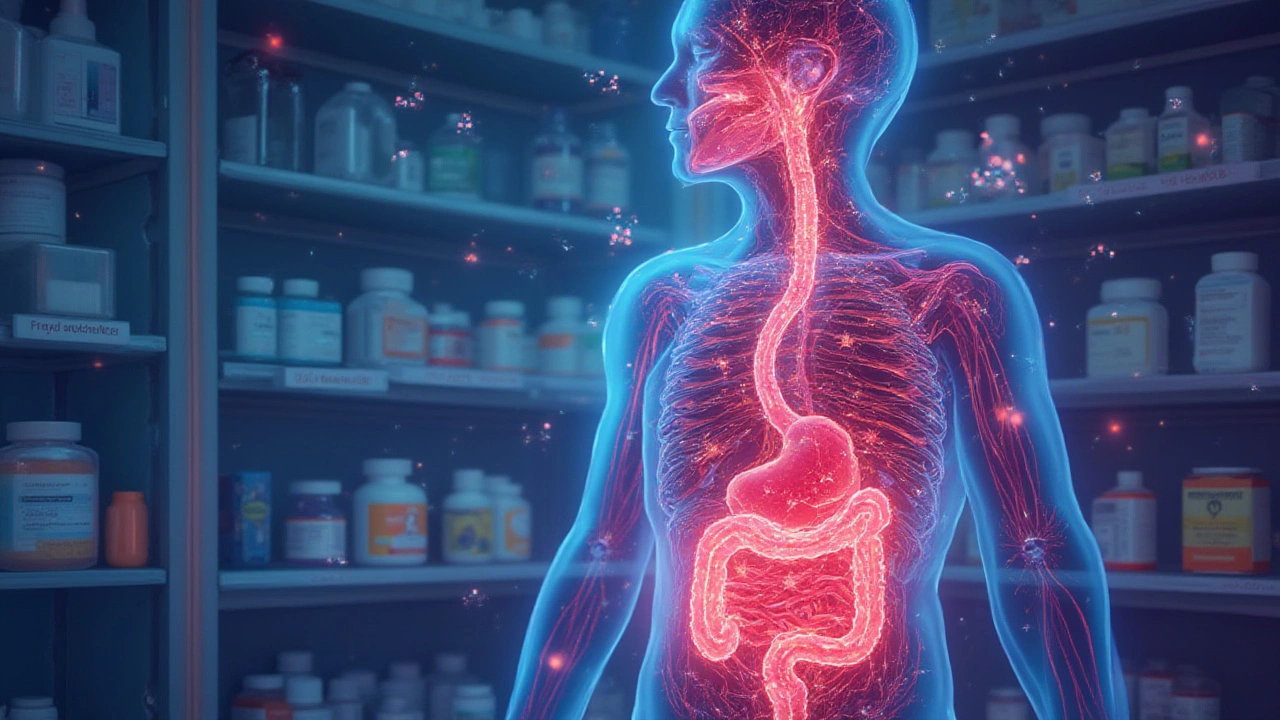How Medication Impacts Gut Microbiota Health: What You Need to Know

Picture your gut as its own bustling city: trillions of bacteria busy working, trading, maybe even fighting from time to time. Now, imagine a medicine sweeping through like a powerful storm. Sometimes it's helpful—sometimes it wipes out whole neighborhoods. The wild thing? Most of us barely think about this invisible world, even though our gut microbiota pretty much shapes the way we digest food, fight disease, and even think or feel daily. My son Dashiell once blasted his own little gut city with antibiotics after an ear infection—and let’s just say, his system sure noticed the change. When you swallow a pill, you’re not just treating what’s making you sick—you're also inviting a ripple effect in your belly's microbial playground.
Meet Your Microbiota: The Gut’s Microbial Universe
Before we dive into how drugs mess with your gut, you’ve got to know what you’re working with. The microbiota is like a microscopic neighborhood of 100 trillion living organisms—bacteria, fungi, viruses—all jam-packed into your intestines. Most of these are helpful. They chop up leftover bits of food, create vitamins like K and B12, and keep nasty invaders at bay. You might be surprised that your microbiota can even talk to your brain, influencing mood and behavior. Scientists call this the "gut-brain axis," and when things get thrown off here, you can end up feeling cranky, anxious, or downright tired.
Each of us has a fingerprint-like microbiome, shaped by how we were born, what we ate as kids, and even how much fresh air we play in. Food is the big player, but medications can rewrite the rules. Some bacteria hate certain medications; others almost seem to thrive. And when you yank out the good bugs, the bad ones usually rush in. This means what you take for one problem might accidentally cause another—think tummy troubles, immune dips, allergies, or brain fog. Not a fun trade-off. But there's hope! Knowing how drugs shake up your gut ecology gives you power to fight back—in smart, simple, real-life ways.
The Gut on Drugs: Which Medications Matter Most?
The big villain here is antibiotics, of course. When prescribed for bacterial infections, antibiotics act like carpet bombs—they kill both invaders and friendly microbes together. Take amoxicillin, for example. One study found that just a single course could reduce certain beneficial bacteria by up to 90%, and sometimes, your gut never fully bounces back. Ever notice that stomach upset or, worse, a bout of diarrhea after antibiotics? That's your gut ecosystem crying out for help.
But it’s not just antibiotics. Drugs you’d never expect—think acid blockers, NSAIDs like ibuprofen, and even antidiabetics—can change the gut’s makeup. Acid blockers (proton pump inhibitors) like omeprazole are super common for heartburn, but studies show they let bad bacteria like Clostridium difficile thrive by lowering stomach acid, sometimes resulting in dangerous infections. NSAIDs, the painkillers you might pop for a headache, can disturb gut bacteria and even poke holes in your gut lining—hello, ulcers.
Even non-prescription medications matter. Laxatives, for example, don’t just move things along; they can shuffle the balance of your microbes. Psychiatric meds like selective serotonin reuptake inhibitors (SSRIs) are also on the radar now—scientists found they can alter which bacteria flourish. This might help explain some of those tough-to-predict side effects, like digestive changes or mood swings. So before you brush off those minor stomach grumbles, remember: your gut bugs might be telling you something.
| Medication | Main Impact on Gut Microbiota | Side Effect Risks |
|---|---|---|
| Antibiotics | Kills broad range of bacteria, disrupts diversity | Diarrhea, infections like C. difficile |
| PPIs (Acid blockers) | Lowers acid, lets unwanted bacteria grow | Increased infection risk |
| NSAIDs | Alters bacterial types, damages gut lining | Ulcers, gut pain |
| Laxatives | Changes number and type of bacteria | Digestive discomfort |
| Metformin (antidiabetic) | Increases beneficial bacteria, but can cause stomach upset | Bloating, diarrhea |
This table sums it up. Not every person reacts the same way—genetics, age, and even what you had for breakfast all matter. But anyone on regular medication should keep the gut-microbiota balancing act top-of-mind.

Real-World Effects: How Medication-Driven Changes Show Up
So how do you know if your gut is off? The classic signs are pretty familiar: bloating, gassiness, constipation, or urgent trips to the bathroom. But it goes deeper. A disrupted microbiota may stir up food intolerances—ever eat dairy perfectly fine, then suddenly struggle after antibiotics? That’s often the microbes. Weak immunity can be a clue, too (your friendly bacteria train your immune system). A Harvard study tracked people post-antibiotics and found their risk for allergies, asthma—even depression—spiked if their microbiome didn’t recover well.
If you’re a parent, you know the chaos that follows antibiotics in kids. When Dashiell finished his meds, he started complaining about stomachaches, occasionally refusing his snacks—total red flag in our house. It took several weeks of yogurt and fiber-rich foods before he got back to normal. Adults aren’t immune either. Long courses of medication, multiple prescriptions, or certain underlying conditions can land you in what doctors call “dysbiosis”—a fancy way of saying your bug balance is busted. This can trigger flares of irritable bowel syndrome, eczema, or even unexplained fatigue. Scientists have found a correlation between gut imbalances and mental health shifts, like increased anxiety or a sudden dip in energy levels.
It’s not all doom and gloom, though. Some medications can actually improve your microbial diversity (for example, metformin, a diabetes drug, boosts certain healthy bacteria). The problem comes when you take more than one gut-altering medication at a time—like antibiotics plus an antacid and maybe a painkiller. That’s when your gut feels blitzed from all sides. Recognizing the pattern—when you feel off after starting a new medication—can help you act fast and bounce back.
Protecting Your Microbiota: Habits and Hacks
Good news: protecting your gut isn’t rocket science, but it does take some intention. Start by asking your doctor about alternatives—sometimes a milder drug, or a shorter course, gets the job done with less mayhem. And if you have to go the medication route, talk probiotics. Yogurt with live cultures is a solid bet, but not all yogurts are created equal—check for types like Lactobacillus or Bifidobacterium. Fermented foods, such as kimchi, kefir, and sauerkraut, also give your microbiome a healthy bump.
Fiber is another gut superpower. Aim for at least 25 grams a day—beans, oats, berries, and even popcorn get the job done. Soluble fiber especially acts as dinner for your good bugs. Hydration helps, too. Staying hydrated keeps your digestive system chugging and lets bacteria grow in the right ways. My tip? Sneak prebiotic foods into snacks—bananas, onions, garlic, and asparagus help your friendly bacteria stay fed and resilient.
If your gut’s already struggling, steer clear of extra sugar and ultra-processed snacks for a while. These feed the “wrong crowd” in your system. Feeling wiped out from antibiotics? Research shows the gut usually rebuilds itself better if you layer in probiotics consistently for a few weeks after finishing the medication. And yes, getting enough sleep—at least 7 hours for adults—matters more than you might think. Both sleep and stress levels influence your microbiome in ways scientists are only beginning to decode.
- Always finish your prescribed medication, unless a doctor says otherwise—otherwise you risk resistance or incomplete treatment.
- Use probiotics when taking antibiotics, but take them at least two hours apart from each antibiotic dose.
- After any gut-altering drug, eat a fiber-rich meal packed with live fermented foods every day for at least a month.
- Don’t forget: check labels. Some seemingly “healthy” probiotic foods are loaded with sugar that cancels their benefits.
- If you notice persistent gut issues after medication, ask for a referral to a gastroenterologist—they can often recommend a targeted recovery plan.
Most people will take a microbiota-wrecking drug at least once a year. The trick is stacking the deck in your favor the rest of the time. Diet, rest, and smart use of supplements, when needed, make a world of difference.

The Future: Can We Outsmart Medication Side Effects?
The science is moving at a crazy pace. Right now, researchers are cooking up custom probiotics that target specific bacteria lost during medication. There’s also talk of “postbiotics”—these are bacteria byproducts rather than live bugs—and even fecal transplants. Before you cringe, yes, doctors actually transplant a healthy person’s gut bacteria to fix really stubborn infections. They work, too: in tough cases of chronic C. difficile infection, success rates are over 90%.
Pharmacogenomics labs are working on ways to predict who’s most likely to see gut problems from medications, so you could get tailored advice on both drugs and gut-friendly habits. Meanwhile, tech companies are even building at-home microbiome kits—you can send off a poop sample and get a readout of your bugs, plus food and lifestyle recommendations custom to your profile. As these tools get cheaper and more reliable, we’ll have way more control over how we recover and protect our own unique gut universes.
Until that future lands on your doorstep, the smartest step is building up daily resilience. Eat for your bugs, keep stress in check, and don’t pop meds carelessly. Be especially mindful if you’re caring for a kid or an older family member. A little prevention goes a long way—maybe even all the way to a happier, healthier belly for the whole family. The gut is a delicate ecosystem, and the next time you break out the medicine cabinet, remember: those trillions of tiny citizens are counting on you, too.